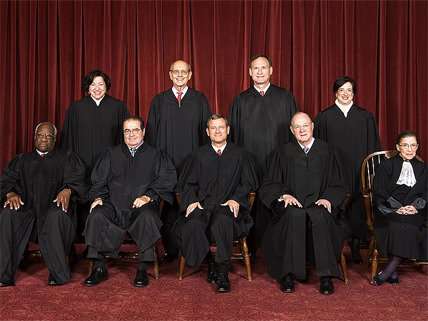May States Impose Criminal Penalties on Suspected Drunk Drivers Who Refuse to Submit to Warrantless Blood Tests? SCOTUS Will Soon Decide
The Supreme Court agrees to hear three new cases dealing with drunk driving suspects and the Fourth Amendment.

In 2013 the U.S. Supreme Court held that police officers in Missouri violated the Fourth Amendment when they obtained a warrantless and nonconsensual blood sample from a man suspected of drunk driving. "In those drunk-driving investigations where police officers can reasonably obtain a warrant before a blood sample can be drawn without significantly undermining the efficacy of the search," Justice Sonia Sotomayor wrote for the majority in Missouri v. McNeely, "the Fourth Amendment mandates that they do so."
It was a significant defeat for law enforcement. But Justice Sotomayor also poined out that it was not a total defeat. "States have a broad range of legal tools to enforce their drunk-driving laws and to secure BAC [blood alcohol concentration] evidence without undertaking warrantless nonconsensual blood draws," she observed. "For example, all 50 states have adopted implied consent laws that require motorists, as a condition of operating a motor vehicle within the State, to consent to BAC testing if they are arrested or otherwise detained on suspicion of a drunk-driving offense."
But that observation by Sotomayor also raised some constitutional questions of its own. For instance, what if a state makes it a crime for a suspected drunk driver to refuse to submit to a warrantless blood test? Does the Fourth Amendment offer any protection to the refuseniks?
Such questions are no longer academic. On Friday the U.S. Supreme Court agreed to hear three consolidated cases that present the following question: "Whether, in the absence of a warrant, a State may make it a crime for a person to refuse to take a chemical test to detect the presence of alcohol in the person's blood."
Two of the three cases come out of North Dakota, where the North Dakota Supreme Court has upheld the constitutionality of state laws imposing such criminal penalties. In the first case, Beylund v. Levi, a man was arrested on suspicion of drunk driving and taken to the hospital by police, where he submitted to a blood test, which was later used to help convict him. The man now maintains that his actions were not truly voluntary since the law coerced him into compliance by placing an unconstitutional condition upon him.
In the second case, Birchfield v. North Dakota, a man was arrested on suspicion of drunk driving but refused to submit to the chemical test. He maintains that the state cannot criminalize his refusal without running afoul of the Fourth Amendment.
The third case the Court agreed to hear, which will be consolidated with the previous two, comes out of Minnesota. Here a man was arrested on suspicion of drunk driving, taken to the police station, and asked to submit to a breath test. He said no, thereby triggering the state law which criminalizes such refusals. "Because we conclude that the breath test the police asked Bernard to take would have been constitutional as a search incident to a valid arrest," the Minnesota Supreme Court held in Minnesota v. Bernard, "charging Bernard with criminal test refusal does not implicate a fundamental right." Not surprisingly, Bernard disagrees. Perhaps a majority of SCOTUS will too.
Oral arguments in Beylund v. Levi, Birchfield v. North Dakota, and Bernard v. Minnesota have not yet been scheduled.


Show Comments (33)